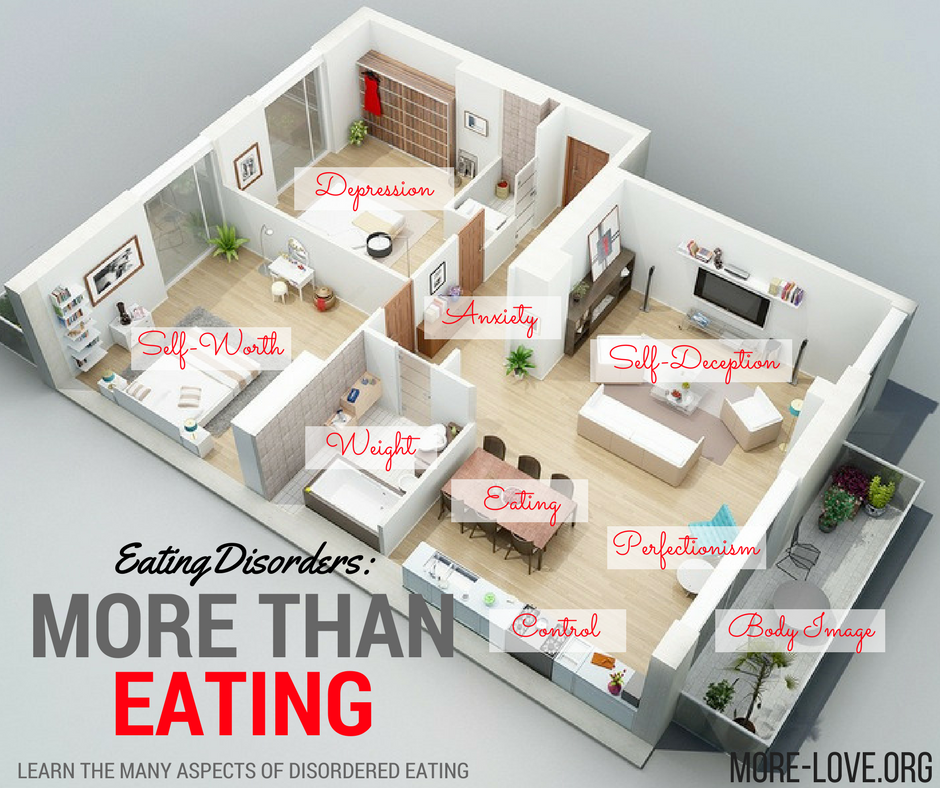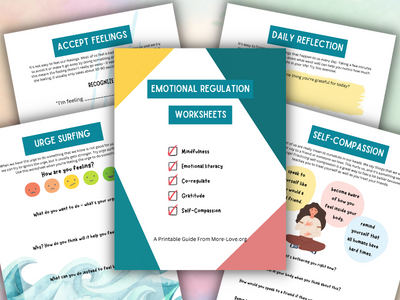
Eating disorders have a perception problem. They are a disorder beginning with the word “eating,” which makes people think they are as simple as food, but they are much more complex than that. People who have eating disorders use food and our bodies as a coping mechanism, so food behaviors are the symptom, but not typically the cause of an eating disorder.
Healing from an eating disorder requires so much more than the right eating plan. As parents, we must recognize the myriad elements that contribute to the development of an eating disorder, including:

Anxiety
Anxiety occurs in a significant portion of people who suffer from eating disorders. Anxiety is a natural and healthy feeling that arises in our bodies on a regular basis. The problem is not the anxiety itself – it is our inability to process our anxiety in a healthy way. For those of us who have trouble with anxiety, our bodies and minds refuse to metabolize our anxiety and fear. Instead of processing anxiety, we may use starvation, binging, purging and other coping mechanisms to numb feelings of anxiety.
Depression
Depression is a common partner to anxiety and eating disorders. Everyone feels sad sometimes, but someone who has depression remains in an unbroken depressed mood state. Negative thoughts become pervasive, taking over our ability to think clearly or make rational decisions about our own self-worth. Those of us who have depression may use starvation, binging, purging and other coping mechanisms in an attempt to self-medicate our depression.
Emotional Regulation Worksheets
Give these printable worksheets to grow more confident, calm and resilient and feel better, fast!
- Self-Esteem
- Self-Regulation
- Mindfulness
- Calming strategies
Control
Many of us who have eating disorders are also on the spectrum for Obsessive Compulsive Disorder (OCD), which is a coping mechanism that drives us to seek ways to control our experience of the world. This is an attempt to self-soothe gone awry. When the world becomes overwhelming for us, we focus on the small things that we can control. You are probably familiar with people who compulsively wash their hands. Those of us with eating disorders may compulsively count our calories and arrange an ideal diet of clean, healthy foods in an attempt to control our overwhelming sense of powerlessness in the world.
Perfectionism
We all want our lives to move relatively smoothly, but perfectionism is far beyond the pursuit of a good life. For those of us with perfectionistic tendencies, we mistake our ability to be loved and accepted with our ability to act appropriately in every situation. When we have eating disorders, our perfectionism can drive us to pursue a “perfect” body because we think that will lead to happiness and love. We try to control our external appearance because we believe that a perfect body will signal to the world that we are perfect people and deserve love, attention, and affection.
Body Image
We live in a society that tells us we need to be thin to be healthy, loved and happy. We know* that the way to achieve thin-ness is to eat less and exercise more, so most of us pursue some level of dieting to achieve the thin goal. For those of us who have eating disorders, we take body image very seriously. Our body image becomes tied up in how we believe the world sees us. We think that if we can only achieve bodily perfection, we will be perfectly OK inside, too.
Self-Deception
In the United States, we know the odds of becoming a millionaire, writing a best-selling book, going to the moon, or becoming a headline actor are very slim. And yet, the societal message is that if we put in the effort, we can beat the odds and achieve almost anything. As we mature, we gain clarity that hard work isn’t enough to achieve those things – there are many more elements involved, most importantly, our genetics, our family connections, and our access to cash. Those of us who have eating disorders fall prey to the millions of societal messages that say we can achieve the perfect body if we just work hard enough. We are deceived into thinking that we can beat the odds and achieve perfection in spite of our genetics, family of origin and bank accounts.
Self-Worth
Feeling worthy is a fundamental human right, and yet many of us who have eating disorders believe that we are unworthy, unloveable, unimportant and impotent. No matter how we look or what people say, our deepest belief that we are not worthy. This distorts everything, and we feel inexplicably driven to achieve self-worth through external means. Instead of seeking community, education, philanthropy or political activism, we seek ways to prove our worth through our bodies. Our lack of self-worth puts every single one of our problems in the lens of our body’s shape and size.
Weight
Today’s feminine ideal** is the same weight and shape as a pre-pubescent girl. It’s no surprise that many eating disorders begin in girls as they enter puberty – this is the time when we are biologically programmed to gain weight. Our breasts, hips, thighs and bellies must grow to prepare our bodies for creating life. Those of us who have eating disorders often associate this new weight with being unattractive. Rather than looking around and seeing the natural body diversity in the world, we begin a battle with a number on the scale. The number becomes a way that we can convince ourselves that we are beautiful and attractive.
It is impossible to cover the many aspects of what leads to disordered eating in a single article. The purpose of this article is to illuminate the idea that as parents we can become aware of the many factors beyond food that influence our children and their unique eating disorders.

Ginny Jones is the founder of More-Love.org, and a Parent Coach who helps parents who have kids with disordered eating and eating disorders. Combining science, compassion, and experience coaching hundreds of families, she helps parents understand what’s going on with their kids’ eating behaviors and teaches them the science-backed skills to heal kids’ relationship with food, improve their body image, and feel better about themselves, their relationships, and life in general.
Ginny has been researching and writing about eating disorders since 2016. She incorporates the principles of neurobiology and attachment parenting with a non-diet, Health At Every Size® approach to health and recovery.
See Our Parent’s Guide To The Causes Of Eating Disorders
*This approach does not actually lead to long-term weight-loss. 95%-98% of all dieters regain all weight lost utilizing this approach.
**Because the majority of eating disorders are in females, we have focused this section on the female body, but it also applies to males, who also get eating disorders.



Great article. I’m always in need of a tune-up to the way I think. Trying to help someone with this disorder can be a mental minefield, especially when you’re hard wired to do the exact opposite of what they need. I’m trying to keep the faith that we can both grow together on this journey. Much love to all.
Hi Lisa, I think all of us needs constant tune-ups. We live in a society that encourages disordered eating behavior everywhere, so we are recovering into an eating-disordered world. We can survive and thrive despite our environmental conditions, but it does require constant vigilance. I wish you all the best!